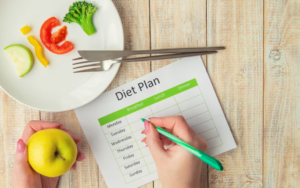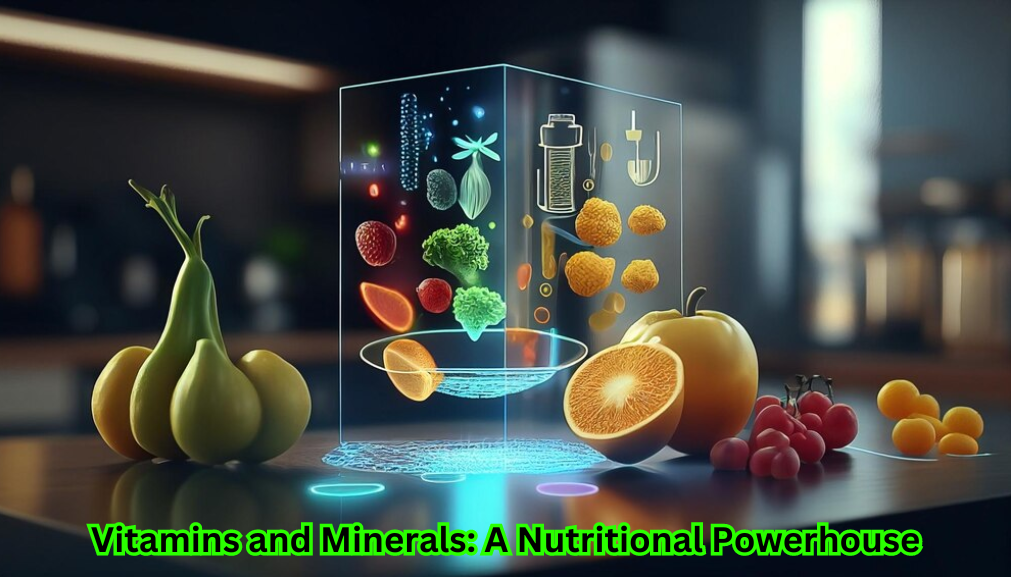Nutrition, vitamins, and minerals are the hidden stars that keep our bodies running. These tiny powerhouses are very important to our health and well-being because they affect everything from the strength of our bones to how well our immune systems work. Let us take a trip into the world of important nutrients and examine how vitamins and minerals affect our daily lives.
How Vitamins and Minerals Work: The Basics
Before we start our study, let us look at the basics. Vitamins and minerals are biological and inorganic substances that our bodies need in small amounts to work properly. Even though they do not give us energy like fats or carbohydrates, they speed up many bodily processes and ensure our bodies work perfectly.

A Look at Vitamins in The Alphabet of Health
Vitamin A: Protector of Eye Health
Vitamin A is the first thing on our list because it is very important for keeping your eyes healthy. Foods that contain this vitamin, such as carrots, sweet potatoes, and leafy greens, help the body’s immune system work better and improve skin health.
Vitamin B: The Fuel for Energy
There are a lot of different B vitamins, and each one has a specific job to do in energy production. These vitamins are very important for health. For example, B1 (thiamine) helps nerves work, and B12 (cobalamin) helps make red blood cells. You can get much from whole grains, meat, and cheese.
Vitamin C: It helps your immune system
Say hello to Vitamin C, which is great for your defense system. Many citrus fruits, berries, and bell peppers contain this vitamin, which helps protect against colds and supports collagen formation, keeping skin flexible and joints healthy.
Vitamin D is known as “the sunshine vitamin.”
Vitamin D, also known as the “sunshine vitamin,” is important for bone development and absorbing calcium. Sunlight is a natural source, but fatty fish and dairy products with added vitamins and minerals help keep levels healthy.
Minerals are essential for good health.
Calcium: The Protector of Bones
Calcium is a mineral that makes bones and teeth strong. Many people get much of it from dairy, leafy greens, and added foods. Calcium is important for bone health, but it is also important for muscle performance and blood clotting.
Iron is what moves oxygen around.
Iron is the hidden star that keeps our blood oxygenated. You can find this mineral in red meat, chicken, and vegetables. It is important to keep your cells from getting anemia and ensure they can produce energy.
Magnesium: The Powerful Manager
Magnesium is a part of more than 300 biological processes in the body. Nuts, seeds, and fresh greens are all great sources that help muscles and nerves work, keep blood sugar in check, and keep bones healthy.
Zinc: The Friend of Immunity
Zinc takes the stage as an important part of the defense system and the healing of wounds. Meat, beans, and nuts all contain this mineral, which helps the body fight off illnesses.
How Vitamins and Minerals Work Together
Learning about the separate parts of vitamins and minerals is interesting, but their real power comes from working together. If you eat a balanced and varied diet, you will get all these nutrients, which will work together to make your body healthy.
How to Deal with Deficits and Overload
The Warning Signs of Deficiencies
Not getting enough vitamins and minerals can cause imbalances, which show up differently. If you notice signs like tiredness, weak nails, or many diseases, you can change your food in time.
How to Know When Too Much Is Enough
On the other hand, getting too much of some vitamins and minerals can be bad for you. Being moderate is important; talking to health pros will help you find the right mix for your needs.
How to Eat Nutrient-Rich Food in Real Life
With this new information, let us put it to use. Here are some useful tips to make sure your food is full of vitamins and minerals:
Diversify Your Plate: To get the most nutrients, eat a wide range of colored fruits and veggies.
How you cook matters: Choose cooking ways that keep the nutrients in, like steaming or sautéing.
Mindful Supplementation: If you need to, talk to a doctor or nurse about taking vitamins to make up for specific deficits.
In conclusion
The journey through the world of vitamins and minerals unveils the intricate tapestry of our nutritional needs. People can help make the future healthier and more lively by knowing their jobs, eating a varied and balanced diet, and being aware of each person’s needs. Vitamins and minerals are more than just parts of our food; they are the building blocks of a healthy life. Because of this, let this study be a step toward a healthy, well-balanced tomorrow.

FAQ:
While nutrition is a complicated field, vitamins and minerals get a lot of attention because they are the essential powerhouses that keep our bodies healthy. We will look at “Vitamins and Minerals: A Nutritional Powerhouse” in a frequently asked questions (FAQ) series, which will help us better understand these important nutrients. Do not be afraid of vitamins and minerals. We will help you understand their roles in our bodies and spot the signs of shortages. Let us look into the most-asked questions to discover why these tiny compounds are important for living a healthy, happy life.
How important are vitamins and minerals for your health?
Vitamins and minerals, also known as vitamins, are very important for our health. Proteins, fats, and carbs are macronutrients that give you energy. These chemicals, on the other hand, speed up different bodily processes. Vitamins A, B, C, and D and minerals like calcium, iron, magnesium, and zinc help systems and cells work properly and keep up with fundamental body functions.
What is a Powerhouse of Nutrition?
The term “nutritional powerhouse” refers to foods that are very high in many vitamins and minerals. These foods are very high in nutrients because they are usually whole and not cooked much. Nutritional powerhouses include fruits, nuts, seeds, leafy veggies, and lean meats. Adding these to your diet will help you get a wide range of micronutrients, which is good for your health and well-being.
What Part Do Minerals and Vitamins Play in Food?
Vitamins and minerals are important for nutrition, from helping the defense system to metabolizing energy. Vitamin A, for example, is good for your eyes and skin. B vitamins are needed to make energy. Vitamin C strengthens your immune system. And minerals like calcium help keep your bones strong. As co-factors in enzyme reactions, these micronutrients support biological processes in check and ensure the body works at its best.
Why do you need vitamins and minerals to do well?
Vitamins and minerals are vital for keeping your body and mind in good shape. They help the body make energy, keep muscles working well, and heal from physical activity. For example, iron is a key part of transporting oxygen, which affects endurance and energy. Vitamins such as B6, B12, and folate are necessary for brain health, memory, and cognitive function. A proper diet of vitamins and minerals is especially important for athletes who want to improve their ability and stay healthy.

